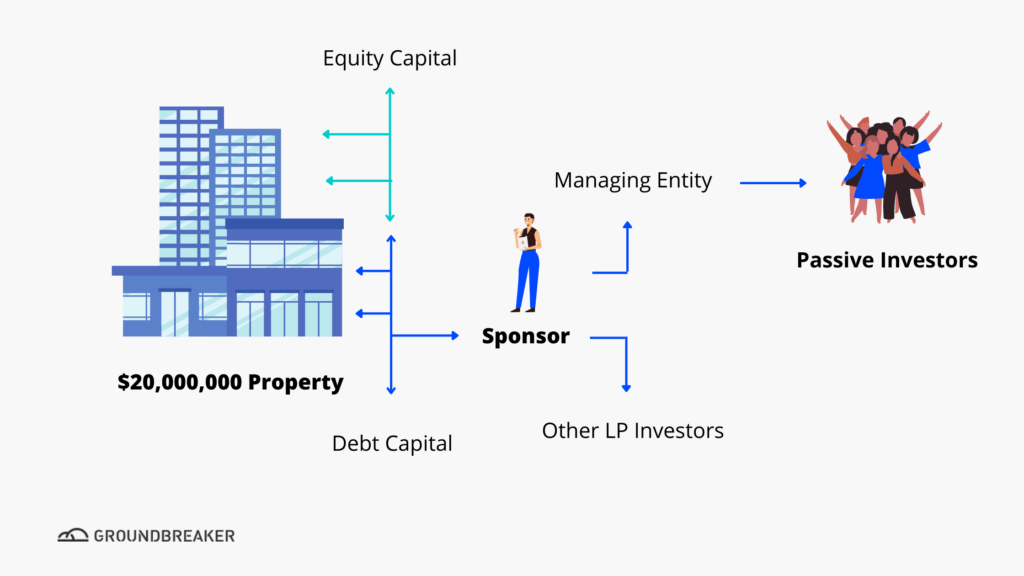Let’s start with what a Private Syndication Club Real Estate syndication is:
By Private Syndication Club facilitating like-minded investors, to come together and pool resources our members can get their feet in the door of some of the best real estate investment markets and some of the most lucrative of real estate investment deals.
However, real estate syndications can be tricky if you are uninformed and not properly educated.
If you don’t take the time to know what you’re doing, you will very likely lose money (and your time, the one resource you can never recover).
This article will walk you through the basics of private real estate syndications and give you practical usable tips needed for getting started without exposing yourself to undue risk.
Let’s start by answering a common question.
WHAT IS REAL ESTATE SYNDICATION?
A real estate syndication is an aggregation of money from multiple investors to invest together in a specific real estate opportunity, for example, a commercial office building, shopping plaza, or apartment complex.
The lead investor, or syndicator, is responsible for finding and vetting investment in the selected opportunities and managing the property’s day-to-day operations. But they may delegate some responsibilities to third-party professionals in the form of sub-contractors, whom he/she will also be responsible for managing on behalf of the collective investors; the Syndicate.

This structure has numerous benefits for the investors and the project itself. Here are just a few:
- Private investors can get involved in a real estate project without the pain of managing a property themselves.
- For the project, it means that experienced professionals handle all of the details and ongoing day-to-day management.
- Real estate syndication allows investors to tap into more considerable capital. This can be especially helpful for new investors who may not have the financial resources or personal wherewithal to go alone.
Some other benefits of real estate syndication include:
- Mitigated Risk: By investing in a syndicate, you spread your risk across multiple properties and a greater number of real estate investors; theoretically with diverse historical experience. This can help protect you from the potential downside of any particular investment nuance.
- Increased potential return: Pooling your resources with other investors gives you access to a larger pool of capital, increasing your potential ROI, and further mitigating risk by having greater budget reserves.
- Improved diversification: By investing in a syndicate, you can gain exposure to a broader range of properties and markets. This can help improve your portfolio’s diversification and reduce your overall risk.
- Ease of entry: Syndication provides a simpler and easier way to start real estate investing, especially if you’re new to the sector.
How Do Syndicators Raise Capital (and Make Money)?
A syndicator (the managing lead), in the context of raising capital, is a person or a company that brings together a group of investors, known as a syndicate, to participate in a financial transaction such as a debt or equity offering.
They have many responsibilities: The syndicator acts as the lead investor, or syndicate manager, and is responsible for coordinating the syndicate, identifying and evaluating investment opportunities, preparing a private placement memorandum (PPM); (document produced to explain the opportunity to the prospective investor partners) and managing the ongoing relationship with the other members of the syndicate.
(Though we’ll get into it a bit later, a PPM is a legal document that outlines the details of an investment opportunity, including the proforma, terms, and risks involved. Its role in raising capital is to provide potential investors with the necessary information to make an informed decision about participating in the syndicate.)
The syndicator is responsible for managing the ongoing relationship with the other members of the syndicate, which involves regular communication, providing updates on the investment, addressing any concerns or questions, and ensuring that the syndicate operates by the agreed-upon terms.
If you, as a syndicator, or syndicate member wish to receive a greater return from syndication, the easiest way is to take on a larger share of the investment by committing more capital compared to other members of the syndicate. This allows you to have a greater financial stake in the investment and potentially hold more decision-making power within the syndicate.
HOW DOES INVESTING IN A SYNDICATION WORK?
Let’s say you want to invest in a multi-unit apartment property in New York through private syndication club real estate syndication.
The first step is to find a reputable and experienced real estate syndicator. This is a operational function of; the Private Syndication Club. Our team is here and experienced in vetting these opportunities, and better still, we have directly invested right alongside our members.
The lead investor is responsible for finding, negotiating, and acquiring the property. They will also manage (or delegate) the operations related to that property.
Once the lead investor finds a property, they’ll build a syndication team. This team typically includes an attorney, accountant, and other professionals experienced in real estate investing.
The lead investor will then create a Private Placement Memorandum (PPM).
Private Placement Memorandum Example

The PPM will include all the relevant information about the investment opportunity, including:
Details about the property
The syndication team
The expected return on investment
The risks involved
Once the PPM is finalized, it will be distributed to potential investors.
If you’re interested in investing, you will complete and sign a subscription agreement. This document outlines your investment amount, rights, and responsibilities as an investor.
Once the real estate deal is finalized, and the syndication team is in place, the lead investor will acquire the property and begin managing it according to the plan laid out in the PPM.
As an investor, you will be entitled to a percentage of the profits (or losses) generated by the property. You will also have the right to inspect the property and review the financial reports related to the investment.
Private Syndication club is a great way to knock down the barries to entry in the realestate syndication investment world. Opportunity only knocks at the door of those will ing to engege.
